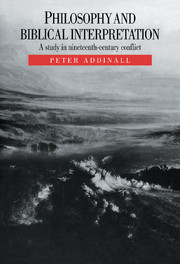Book contents
- Frontmatter
- Contents
- Preface
- Introduction
- 1 The general picture
- 2 David Hume
- 3 William Paley
- 4 Biblical conservatism
- 5 Conservative natural theology: Paley's design argument
- 6 Conservative natural theology: Thomas Chalmers
- 7 Liberal natural theology
- 8 The later nineteenth century
- 9 Immanuel Kant
- 10 Critical philosophy and the Bible
- Conclusion
- Notes
- Bibliography
- Index
- Frontmatter
- Contents
- Preface
- Introduction
- 1 The general picture
- 2 David Hume
- 3 William Paley
- 4 Biblical conservatism
- 5 Conservative natural theology: Paley's design argument
- 6 Conservative natural theology: Thomas Chalmers
- 7 Liberal natural theology
- 8 The later nineteenth century
- 9 Immanuel Kant
- 10 Critical philosophy and the Bible
- Conclusion
- Notes
- Bibliography
- Index
Summary
Religious belief has always had its critics, and outstanding among them was the eighteenth-century Scottish philosopher David Hume, whose critique of religion is perhaps unsurpassed for its lucidity and persuasive force.
Hume's attack evoked two very different replies: one from the Englishman William Paley, and the other from the Prussian philosopher Immanuel Kant. In Britain Paley's reply was very popular and influential, but it was fatally flawed. Kant's response, on the other hand, was thoroughgoing and fundamentally correct, but not popular in Britain, and often not properly understood even by the few who were prepared to give it serious consideration.
During the nineteenth century the natural sciences underwent rapid development and provided religion's critics with massive evidence supporting Hume's suggestion that the world might turn out to be entirely explicable in terms of its own inherent forces, thereby making reference to God not merely redundant, but a positive hindrance to the proper understanding of human existence.
At the same time, scientific discoveries contradicted certain statements in the Bible, thus threatening the authority of sacred literature which was generally regarded as essential to the life of both Church and State. The mounting pressure of scientific evidence during the nineteenth century led to a split in the ranks of biblical scholars, into conservatives and liberals. The former endeavoured to maintain traditional views of biblical authority and what were supposed to be traditional or plain interpretations of disputed texts, while the latter admitted the validity of German critical scholarship and turned biblical studies into a humanistic enterprise with what might be called a scientific validity of its own.
- Type
- Chapter
- Information
- Philosophy and Biblical InterpretationA Study in Nineteenth-Century Conflict, pp. 1 - 3Publisher: Cambridge University PressPrint publication year: 1991

